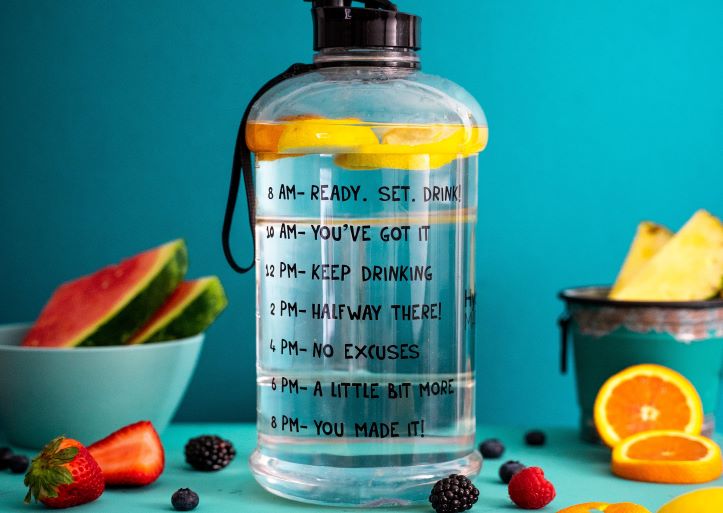Wondering what is the role of hydration in fitness? Well, hydration is a critical factor when it comes to achieving optimal fitness levels. Whether you’re a professional athlete or a fitness enthusiast, staying properly hydrated is essential for your performance and overall well-being. In fact, hydration plays a vital role in numerous bodily functions, including temperature regulation, nutrient transport, and joint lubrication. It acts as the fuel that keeps your body running smoothly and efficiently, especially during exercise.
Now, let me share with you an engaging anecdote about hydration. Did you know that the human body is approximately 60% water? That’s right! We’re more water than anything else. Imagine a glass filled to the brim with water, representing your body’s hydration level. Just like a well-filled glass, proper hydration keeps things flowing smoothly within your body, ensuring all systems work harmoniously. However, when that glass starts to empty, dehydration sets in, leading to decreased performance, fatigue, and even potential health risks.
With that fascinating fact in mind, let’s dive deeper into the importance of hydration in fitness. In the following sections, we’ll explore how hydration impacts exercise performance, discuss practical hydration strategies, and uncover the signs of dehydration to help you stay on top of your hydration game. So grab a refreshing glass of water and let’s quench our thirst for knowledge about the vital role of hydration in fitness!
Understanding Hydration Before Learning What is the role of hydration in fitness
What is hydration?
Hydration refers to the process of maintaining adequate water levels in the body to support its proper functioning. It involves replenishing the water content lost through various bodily processes, such as sweating, breathing, and urination.
Explanation of the body’s water composition
The human body is predominantly composed of water. On average, water makes up about 60% of an adult’s total body weight. It is present in every cell, tissue, and organ, playing a vital role in numerous physiological functions.
Significance of water for bodily functions
Water is essential for optimal bodily functions. Here are some key points highlighting its significance:
Lubrication: Water acts as a lubricant for joints, facilitating smooth movement and reducing the risk of injuries.
Temperature regulation: Sweat, which is primarily water, helps regulate body temperature by cooling the skin through evaporation.
Nutrient transport: Water serves as a medium for transporting nutrients to cells and removing waste products from the body.
Digestion and absorption: Adequate hydration supports proper digestion and absorption of food, ensuring optimal nutrient utilization.
Blood circulation: Sufficient water intake helps maintain blood volume, enabling efficient circulation of oxygen and nutrients throughout the body.
Electrolyte balance: Water assists in maintaining the balance of electrolytes, such as sodium, potassium, and chloride, which are crucial for nerve and muscle function.
Waste elimination: Ample hydration promotes healthy kidney function, aiding in the filtration and excretion of waste products through urine.

Hydration and Exercise Performance
Impact of dehydration on athletic performance:
Dehydration can have a significant impact on athletic performance. When the body lacks proper hydration, several negative effects can hinder your fitness goals. These include:
Decreased endurance: Dehydration reduces the body’s ability to maintain a steady level of endurance during physical activity, leading to premature fatigue.
Impaired cognitive function: Insufficient hydration can negatively affect concentration, focus, and decision-making abilities, hindering your overall performance.
Decreased strength and power: Dehydration can compromise muscle strength and power output, making it harder to achieve optimal results during strength training or high-intensity workouts.
Reduced exercise capacity: Dehydration limits the body’s ability to transport oxygen to working muscles, leading to reduced exercise capacity and decreased overall performance.
Importance of water for energy production:
Water plays a vital role in energy production during exercise. Here’s why it’s crucial:
ATP production: Adenosine triphosphate (ATP), the body’s primary energy source, requires water for its synthesis. Without adequate hydration, ATP production can be compromised, impacting your energy levels.
Nutrient absorption: Water helps transport nutrients, including carbohydrates, proteins, and fats, to cells for energy production. Proper hydration ensures efficient nutrient absorption and utilization.
Metabolism regulation: Water is involved in metabolic processes that convert food into energy. Staying hydrated supports optimal metabolic function and energy production.
Effects of dehydration on muscle function and recovery:
Dehydration can negatively impact muscle function and recovery. Consider the following effects:
Muscle cramps: Inadequate hydration increases the risk of muscle cramps during exercise, which can be painful and limit your performance.
Delayed recovery: Dehydration impairs the body’s ability to repair damaged muscle tissues, leading to delayed recovery time between workouts.
Increased risk of injury: Dehydration reduces joint lubrication and muscle elasticity, increasing the risk of injuries such as strains and sprains.

Hydration Strategies for Fitness
Recommended daily water intake for active individuals
For active individuals, it is important to maintain adequate hydration throughout the day. The recommended daily water intake can vary depending on factors such as body weight, activity level, and climate. As a general guideline, aim for the following:
Men: About 3.7 liters (or approximately 13 cups) of water per day.
Women: Around 2.7 liters (or about 9 cups) of water per day.
Remember, these are general recommendations, and individual needs may vary. It’s essential to listen to your body and adjust your water intake accordingly.
Pre-workout hydration tips
- Drink 1-2 cups of water 2-3 hours before your workout.
- Sip on water in the hour leading up to your workout.
- Avoid consuming excessive amounts of water immediately before exercise to prevent discomfort.
Hydration during exercise – water vs. sports drinks:
| Water | Sports Drinks | |
| Hydration | Replenishes fluids | Replenishes fluids and electrolytes |
| Electrolytes | Generally low | Contains electrolytes for endurance |
| Intensity | Suitable for moderate | Suitable for intense or prolonged |
| intensity exercise | exercise | |
| Calories | No calories | May contain calories and sugar |
Ultimately, the choice between water and sports drinks depends on your individual needs, the intensity of your exercise, and personal preferences. If you’re unsure, consult with a healthcare professional or a sports nutritionist who can provide personalized guidance based on your specific fitness goals and requirements.
Post-workout hydration and recovery
After exercise, it’s crucial to replenish fluids and support recovery. Here are some post-workout hydration tips:
- Drink water immediately after your workout to replace fluids lost through sweat.
- If you engage in intense or prolonged exercise, consider a sports drink to replenish electrolytes.
- Consume a post-workout snack or meal that includes water-rich foods like fruits and vegetables to aid in hydration.
Signs of Dehydration
Common symptoms of dehydration
- Thirst
- Dry mouth and throat
- Fatigue or low energy levels
- Headache
- Dizziness or lightheadedness
- Dark-colored urine
- Dry skin
- Muscle cramps
- Reduced urine output
How to recognize dehydration during physical activity
- Increased thirst during exercise
- Dry or sticky mouth
- Elevated heart rate
- Rapid breathing or shortness of breath
- Feeling overly fatigued or weak
- Reduced performance or endurance
- Difficulty maintaining focus or concentration
Importance of monitoring urine color for hydration status
- Light or pale yellow urine indicates good hydration.
- Dark yellow or amber-colored urine may be a sign of dehydration.
- The darker the urine, the more urgent the need to rehydrate.
- Monitoring urine color can serve as a simple indicator of hydration status and help you make adjustments to your fluid intake.
When to See a Doctor?
While staying hydrated is important for overall health, there are times when it’s crucial to seek medical attention. If you experience severe or persistent symptoms such as extreme thirst, dizziness, confusion, rapid heartbeat, or decreased urine output despite adequate hydration, it’s essential to consult a doctor.
Additionally, if you have underlying medical conditions or are taking medications that affect fluid balance, it’s advisable to seek medical advice to ensure optimal hydration and address any potential health concerns. Your doctor can provide personalized guidance and recommendations based on your specific needs and circumstances.
Hydration and Weight Loss
How proper hydration aids in weight loss
Proper hydration plays a significant role in supporting weight loss efforts. Here’s how water helps with shedding those extra pounds:
Water as an appetite suppressant:
- Drinking water before meals can help reduce hunger and calorie intake.
- Water fills up the stomach, leading to a feeling of fullness, which may prevent overeating.
- Staying hydrated can help distinguish between true hunger and thirst, reducing unnecessary snacking.
Benefits of drinking water before meals
- Promotes portion control by creating a sense of fullness, leading to reduced calorie consumption.
- Enhances digestion and nutrient absorption, optimizing your body’s ability to utilize nutrients from food.
- Helps flush out waste products and toxins from the body, supporting overall detoxification.
- Hydrated cells function optimally, improving metabolism and energy expenditure.
- Drinking water before meals can aid in weight loss efforts by promoting a healthier eating pattern.
Hydration and Muscle Building
Role of water in protein synthesis
- Water is essential for protein synthesis, the process by which the body builds and repairs muscle tissue.
- Adequate hydration supports the transportation of amino acids, the building blocks of protein, to the muscles.
- Water assists in the conversion of amino acids into new muscle tissue, promoting muscle growth and repair.
Hydration’s impact on muscle growth and repair
Proper hydration plays a crucial role in muscle growth and repair processes. When you engage in intense workouts, your muscles undergo stress and microtears. Hydration is essential for providing the necessary nutrients and oxygen to support the repair and rebuilding of these damaged muscle tissues.
Adequate hydration supports the delivery of vital nutrients, such as amino acids, to the muscles. These amino acids are the building blocks of protein, which is essential for muscle growth. Without sufficient water intake, the transportation of these amino acids to the muscles can be compromised, hindering the muscle recovery process.
Additionally, staying well-hydrated helps in the removal of waste products, such as lactic acid, from the muscles. Accumulation of lactic acid can lead to muscle soreness and fatigue. By maintaining optimal hydration levels, you can aid in flushing out these waste products, reducing muscle soreness, and promoting faster recovery.
Furthermore, proper hydration ensures that your muscles maintain their elasticity and contractile function. Hydrated muscles are better equipped to generate force and perform optimally during workouts, leading to improved strength and endurance. By staying hydrated, you can maximize your muscle’s potential and reduce the risk of injuries.
Optimal hydration for muscle strength and endurance
If you have a thirst about how to build muscle mass then know that, optimal hydration is vital for maximizing muscle strength and endurance during your workouts. Dehydration can have detrimental effects on muscle function, leading to decreased strength and compromised exercise performance. When you are dehydrated, your muscles are more prone to fatigue, which can hinder your ability to perform at your best.
Drinking enough water before, during, and after exercise helps maintain adequate muscle hydration, ensuring optimal muscle function. Well-hydrated muscles have better elasticity, allowing them to contract and relax efficiently. This improves overall muscle strength and power output, enabling you to push harder and achieve better results during your workouts.
In addition to supporting muscle function, proper hydration helps maintain electrolyte balance. Electrolytes, such as sodium, potassium, and magnesium, are crucial for muscle contraction and nerve signaling. When you sweat during exercise, you lose these electrolytes along with fluids. Replenishing electrolytes through proper hydration helps maintain muscle strength and endurance, preventing muscle cramps and promoting optimal performance.
To optimize your muscle strength and endurance, make sure to prioritize hydration before, during, and after your workouts. Remember to drink water regularly throughout the day and listen to your body’s signals for thirst. By staying well-hydrated, you can enhance your muscle’s performance and make the most out of your fitness journey.
Tips for Staying Hydrated
Practical strategies for increasing water intake
- Carry a reusable water bottle with you throughout the day as a visual reminder to drink water.
- Set specific goals for water intake, such as finishing a certain number of water bottles by a certain time.
- Drink a glass of water as soon as you wake up in the morning to kickstart your hydration.
- Flavor your water with slices of lemon, cucumber, or berries to make it more enjoyable and refreshing.
- Use smartphone apps or smart water bottles that send reminders to drink water at regular intervals.
Hydration aids beyond water (e.g., fruits, vegetables)
- Consume water-rich fruits and vegetables like watermelon, cucumbers, strawberries, and citrus fruits.
- Enjoy soups, smoothies, and herbal teas that contribute to your overall fluid intake.
- Incorporate hydrating foods into your meals, such as salads, Greek yogurt, and broth-based soups.
Incorporating hydration reminders into daily routine
- Set hourly reminders on your phone or computer to take a sip of water.
- Use post-it notes or stickers around your workspace or home as visual cues to hydrate.
- Pair hydration with daily habits, like drinking a glass of water before and after brushing your teeth.
- Make it a habit to drink water during specific times, such as during breaks or before meals.
What Not to Drink When Exercising?
When it comes to staying hydrated during exercise, choosing the right beverages is just as important as consuming enough fluids. While there are numerous hydrating options available, there are certain drinks you should avoid. Let’s take a closer look at what not to drink when exercising:
Sugary Drinks: Avoid beverages that are high in added sugars, such as soda, fruit juices, and sweetened sports drinks. These drinks provide empty calories and can lead to energy crashes and dehydration due to their high sugar content.
Alcohol: Drinking alcohol before or during exercise is not recommended. Alcohol is a diuretic, which means it increases urine production and can dehydrate you quickly. It also impairs coordination, reaction time, and judgment, increasing the risk of accidents or injuries during physical activity.
Caffeinated Beverages: While moderate caffeine intake can be beneficial for enhancing performance, excessive consumption can have negative effects. Caffeine is a natural diuretic that can increase urine production and contribute to dehydration. Energy drinks and heavily caffeinated beverages should be avoided as they can lead to dehydration and potentially harmful side effects.
Carbonated Drinks: Carbonated beverages like soda or sparkling water may cause discomfort during exercise due to their gassy nature. The carbonation can lead to bloating, indigestion, and discomfort in the stomach, making physical activity less enjoyable and potentially impacting performance.
Dairy-Based Beverages: Drinks like milkshakes, full-fat milk, or cream-based beverages are not ideal for hydration during exercise. These beverages can be heavy on the stomach, causing discomfort and potentially affecting performance. They may also lead to an increased risk of gastrointestinal issues during physical activity.
Instead of these drinks, opt for hydrating choices like water, electrolyte-enhanced sports drinks (with no added sugars), or natural fruit-infused water. These options provide the necessary hydration without unwanted additives or adverse effects on your exercise routine.
Conclusion
Now we can say that you have known everything about what is the role of hydration in fitness. Proper hydration is crucial for achieving optimal fitness results. Throughout this blog post, we have emphasized the significance of hydration in fitness. Hydration supports exercise performance, muscle growth, and recovery. It aids in maintaining energy levels, preventing dehydration-related issues, and optimizing overall physical well-being. As you jump on your fitness journey, make hydration a top priority.
By drinking enough water, choosing hydrating foods, and incorporating healthy hydration habits into your routine, you can enhance your performance, reduce the risk of injuries, and maximize your fitness gains. Remember, proper hydration is the key to unlocking your full potential in the realm of fitness. Drink up and thrive!








